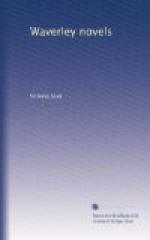Edward’s power of imagination and love of literature, although the former was vivid and the latter ardent, were so far from affording a remedy to this peculiar evil, that they rather inflamed and increased its violence. The library at Waverley-Honour, a large Gothic room, with double arches and a gallery, contained such a miscellaneous and extensive collection of volumes as had been assembled together, during the course of two hundred years, by a family which had been always wealthy, and inclined, of course, as a mark of splendour, to furnish their shelves with the current literature of the day, without much scrutiny or nicety of discrimination. Throughout this ample realm Edward was permitted to roam at large. His tutor had his own studies; and church politics and controversial divinity, together with a love of learned ease, though they did not withdraw his attention at stated times from the progress of his patron’s presumptive heir, induced him readily to grasp at any apology for not extending a strict and regulated survey towards his general studies. Sir Everard had never been himself a student, and, like his sister, Miss Rachel Waverley, he held the common doctrine, that idleness is incompatible with reading of any kind, and that the mere tracing the alphabetical characters with the eye is in itself a useful and meritorious task, without scrupulously considering what ideas or doctrines they may happen to convey. With a desire of amusement, therefore, which better discipline might soon have converted into a thirst for knowledge, young Waverley drove through the sea of books like a vessel without a pilot or a rudder. Nothing perhaps increases by indulgence more than a desultory habit of reading, especially under such opportunities of gratifying it. I believe one reason why such numerous instances of erudition occur among the lower ranks is, that, with the same powers of mind, the poor student is limited to a narrow circle for indulging his passion for books, and must necessarily make himself master of the few he possesses ere he can acquire more. Edward, on the contrary, like the epicure who only deigned to take a single morsel from the sunny side of a peach, read no volume a moment after it ceased to excite his curiosity or interest; and it necessarily happened, that the habit of seeking only this sort of gratification rendered it daily more difficult of attainment, till the passion for reading, like other strong appetites, produced by indulgence a sort of satiety.
Ere he attained this indifference, however, he had read, and stored in a memory of uncommon tenacity, much curious, though ill-arranged and miscellaneous information. In English literature he was master of Shakespeare and Milton, of our earlier dramatic authors, of many picturesque and interesting passages from our old historical chronicles, and was particularly well acquainted with Spenser, Drayton, and other poets who have exercised themselves on romantic fiction,




